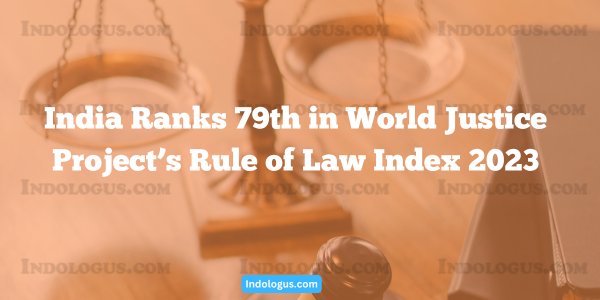India stands at 79th out of 142 countries in the 2023 World Justice Project (WJP) Rule of Law Index. This year’s Index shows a global decline in rule of law for the sixth consecutive year, with 59% of countries—including India—seeing a decrease in their scores. India’s rule of law score fell from 0.50 in 2022 to 0.49, highlighting challenges in areas like corruption control and fundamental rights.
Key Global and Regional Findings
- Global Decline in Rule of Law: Since 2016, the rule of law has declined in 78% of countries, with the most significant drops in Fundamental Rights. This factor saw a decrease in 77% of the countries studied, including India, where human rights continue to face challenges.
- Erosion of Constraints on Government Powers: Over the past seven years, nearly 74% of countries saw reduced checks on government powers, a trend that includes India. Although the decline in executive constraints has slightly slowed, the report indicates that this pattern remains widespread.
- Justice System Delays: The Index also notes a growing number of countries facing civil justice delays, with 66% experiencing declines in this area in 2023, up from 61% in 2022. India, however, showed some improvement in Civil Justice, bucking the global trend of worsening delays and enforcement issues.
India’s Standing in South Asia and Globally
Regionally, India ranks 3rd out of six South Asian countries, following Nepal (71st globally) and Sri Lanka (77th). In comparison, countries like Bangladesh, Pakistan, and Afghanistan rank lower in the region, with Afghanistan at 140th globally.
India also fares relatively well among lower-middle-income countries, where it holds the 9th position out of 37. Globally, the Index’s top countries include Denmark, Norway, Finland, and Sweden, while Venezuela ranks lowest, followed by Cambodia, Afghanistan, Haiti, and the Democratic Republic of the Congo.
India’s Performance Across Key Factors
India’s rankings in various rule of law factors reflect both achievements and challenges:
- Constraints on Government Powers: 58th globally, 2nd in South Asia, and 4th among lower-middle-income countries, showing some resilience in limiting executive overreach.
- Absence of Corruption: 96th globally, indicating the ongoing need for greater judicial transparency and accountability.
- Open Government: India ranks high in this area, at 42nd globally and 1st regionally, highlighting transparency improvements.
- Fundamental Rights: India’s rank of 99th signals areas for improvement, particularly regarding the protection of individual rights and freedoms.
- Order and Security: Ranking 105th globally, challenges in maintaining security and order remain an area of concern.
- Civil and Criminal Justice: While showing improvement in Civil Justice, India ranks 111th overall, indicating delays and accessibility issues. Criminal Justice, with a ranking of 93rd, also highlights areas for reform.
A Call for Strengthening the Rule of Law
According to WJP President William H. Neukom, “The world remains gripped by a rule of law recession characterized by executive overreach, curtailing of human rights, and justice systems that are failing to meet people’s needs.” The Index suggests that addressing these issues can improve accountability, reduce corruption, and protect citizens’ rights.
India’s progress in areas like Open Government is a positive indicator, but strengthening fundamental rights, enhancing judicial transparency, and reducing civil justice delays are essential steps for a stronger rule of law foundation.
For detailed data on India’s rule of law performance across all 44 subfactors, explore India’s full report. The full rankings and report are available at the World Justice Project website.




